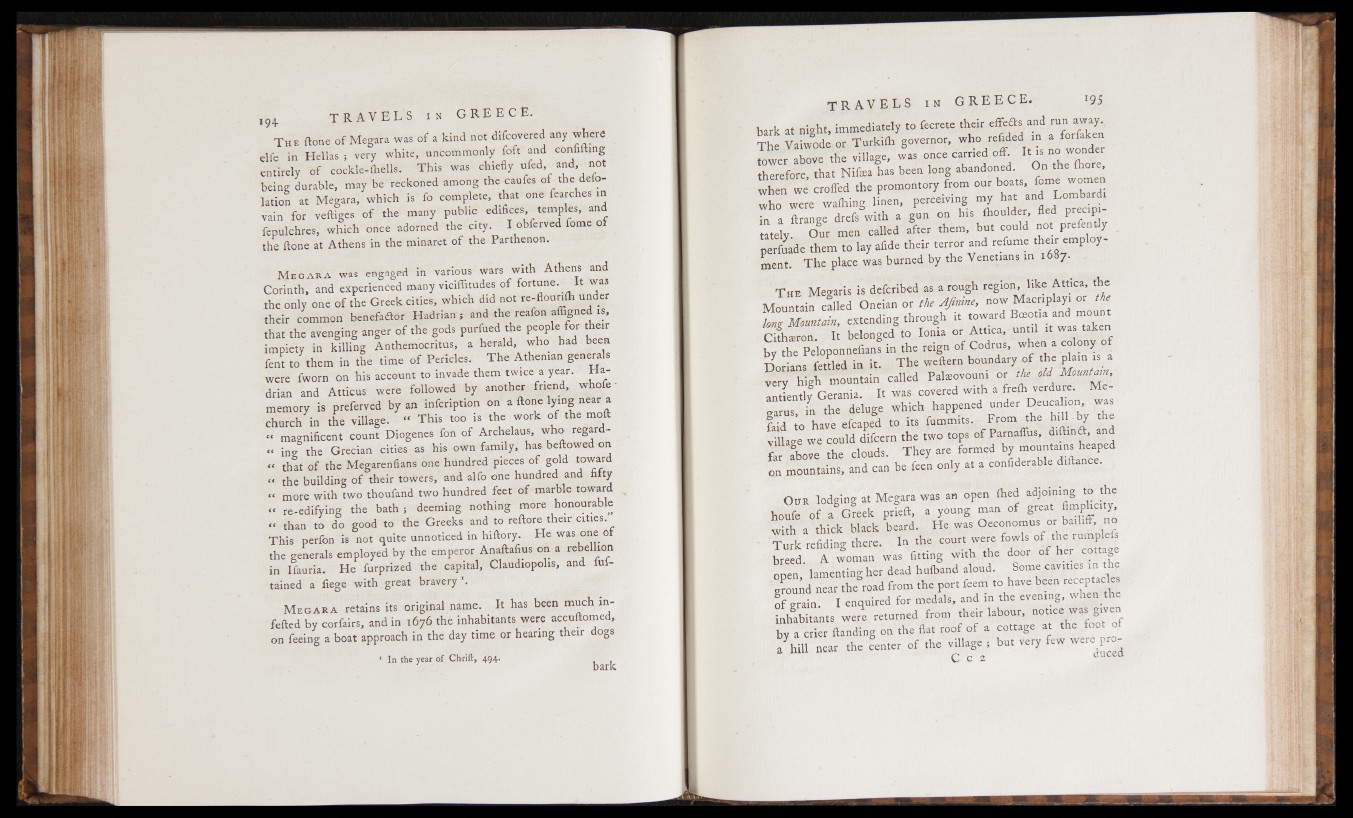
T he ftone o f Megsia was of. a kind not dlfcovered any where
elfe in Hellas i Very white, uncommonly foft and «mulling
entirely o f cockle-ffaellai This was chiefly
being durable, may be reckoned among the caufes of_ the d e f lation
at Megara, which is f complete, that oneTearches m
vain for veftiges of the many public edifices temples,.and
fepulchres, which once adorned the city. 1 I obferved fome of
the ftoiie at Athens in the minaret of the Parthenon.
M e g a r a was engaged in various wars with Athens and
Corinth, and experienced many viciffitudes of fortune. I t was
the only one of the Greek cities, which did not re-floimfh under
their common benefactor Hadrian i and the^reafdn affignedl is,
that the avenging anger of the gods purfued the PeoPle for the1^
impiety in kilhng Anthemocriius, a herald, who had been
fent to them in the time of Pericles. T h e Athenian generals
were fworn on his Account to invade them t^icera-year.. 'Hadrian
and Atticus were followed by another
memory is preferved by an infeription on
church in the village. “ This too is the-work r f th em o f t
“ magnificent count Diogenes fon of Archelaus, who regard-
« ing the Grecian cities , as his own faittilyi ha* beftowerdon
« that of the Megarenfians one hundred-pieces of gold foward
“ the building of their towers, and alfo'one hundred and titty
« more with two thoufand two hundred feet of marble toward
“ re-edifying the bath j deeming nothing more honourable
“ than to do good to the Greeks and to reftore their cities.
This perfon is not quite unnoticed in hiftory. He was one of
the generals employed by the emperor Anaftafius on a rebellion
in Ifauria. He furprized the capital, Claudiopolis, and fuf-
tained a fiege with , great bravery1.
Megara retains its original name. It has been much m-
fefted by corfairs, and in 1676 the inhabitants were accuftomed,
on feeing a boat approach in the day time or hearing their dogs
1 In the year of Chrift, 494-
bark
195
bark a t night, immediately to fecrete their, effeds and run away., ,
The Vaiwode or Turkilh governor who refided in a forfaken
tower above tfi'e village, was onee earned off. 1 1 ‘ s “ ° ^ “ d' r
therefore, that Nifea has been long abandoned. On the ihote,
when we croffed the promontory from our boats,, fome women
who were wathing lineo, perceiving my hat and Lombard.
M ft Ingrdrefe with a .gun 0» his fttoulder, fled preetp.-
t“ l l d f .1 1 called.after them, but could not prefendy
perfuade them to lay afide their terror and refume their employ-
ment. The place was burned by, the Veneuans m i 7. ,
T he Megaris is defcnbedstsafough'region, likp Attica, the
Mountain S l e d Onei'an OT the Afinme, now Macrtplayt o r f
long Mountain, extending through it. toward B^ * ‘a “ d .
Cifttteson. It belonged to Ionia or, Atuca,-until «w a s taken
by the*Peloponnefians in the reign of fiodrus,.when a colony of
Dorians fettled in i f . The weftern,boundary o | ^he plain is a
very h lfl^SouXam called Pateovoqni or
ontLmlv Gerania. It w a s - covered with a freih verdure. Me-
p u s , i * e , i e lH g e which O p e n e d under QeucaUorn was
faid to have efcaped to its furnmits.^ From the hill -hy th
r i l g e we could difeern the two tops of Parnaffus, diftmft, and
far fbove the clouds. They are formed by mountains heaped
Qn m o q n f f i 'ln d can be feen only at a jonfiderable diftance. ,
Our lodging at Megara was an open toed adjoining to the
h'oufe Qf aS Greek prieft, a young man of great fimphci
with a thick black beard He was Oeconomus or ^aihff )no
* Turk refiding there. In the court were fowls o f .the rumpleis
breed A"woman was fitting f | the door o f her. cottage
open, lamenting her dead hutoand aloud.
'ground near the road from th|port feem to h a y e ^ - r e c e ^ ^
of grain. I enquired for medals, and in the evening, when the
inhabitants were , returned fropi their labour,
by a crier ftanding on the flat roof of a cottage a e
/ h i l l near the center of the village ; but very few werei pro
C c 2 aucea